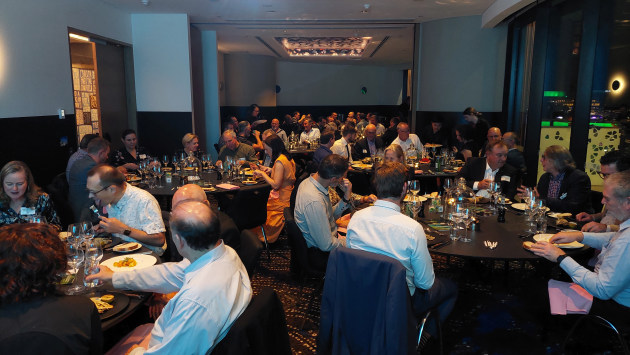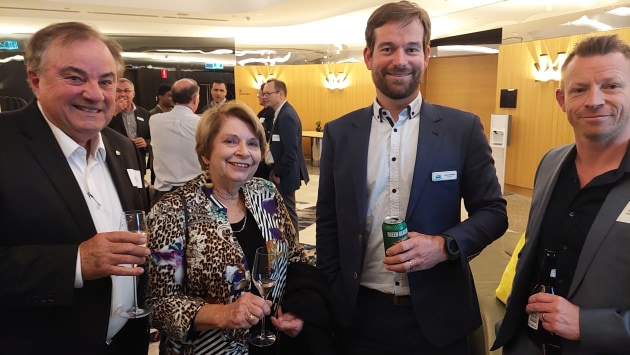The APPMA dinner evening in Brisbane in early August saw a high-powered panel discussing the big issues impacting packaging and processing. Under the spotlight was government policy gone awry, the shortage of young talent, and the pressing need for cross-industry collaboration.
Packaging and processing professionals had a treat at Brisbane’s glamorous W Hotel, with an expert panel shedding clear light on the pressing issues for manufacturing, at the APPMA member dinner.

As the first APPMA Queensland event since the end of Covid restrictions, the well-attended evening saw some 70 industry people come together, to enjoy face-to-face networking, renew friendships, enjoy a delicious meal, and be given an insight into the dynamics impacting the potential for manufacturing post-Covid.
Rather than invite a single speaker, APPMA this time elected to have a panel, which led discussion on a wide range of topics, all under the umbrella of major industry issues – and with three professors included in the discussion it was a high-level debate. At the forefront of the topics on the agenda was government policy for manufacturing, which, according to the panel, when compared to competitive economies around the world is sadly lacking. Attracting young talent to industry and to manufacturing is a key area of concern, and one that occupied both the panel and the audience. Growing knowledge through collaboration, cross pollination and clusters was explored as a major opportunity.
Hosting the evening was Emeritus Professor Roy Green from UTS. He began by highlighting how far Australia’s manufacturing output has fallen, and how far behind similar countries it has fallen, and why it will fall further if nothing changes – and why all that is bad news for all of us.
According to Prof Green, Australia has dropped to 19th position in the league table of competitiveness, from a top ten position, and for economic complexity – which he says is a solid measure of future sustainability – Australia has dropped from a position in the forties to 87th in the world. He said that in the 1960s and ‘70s manufacturing accounted for 25-30 per cent of Australia’s GDP, today it is just six per cent, which he said is the lowest level of manufacturing self-sufficiency in the OECD.
And the Professor pulled no punches with the future outlook, saying that investment in R&D in Australian was low and getting lower, falling to 1.79 per cent of GDP, from the previous low figure of 2.2 per cent. He pointed out that countries with an evidently brighter outlook, such as Germany, Korea and Israel, are investing treble what Australia spends on R+D as a percentage of GDP.
The commodities boom has shielded Australia from the consequences of its lack of investment in the future, but as Prof Green pointed out, we don’t add value to the dirt, and it won’t last forever. He said, “The commodity boom, which increased the value of our dollar, gave us a windfall revenue, so that our living standards increased by about 15 per cent in six years for no effort on our part, but behind this big consumption boom lay a structural deterioration of our economy, and that's the deterioration that we're living with now.”
Prof Green told the audience that until we really build up our commitment to knowledge-based industries and services, with advanced manufacturing at the centre, we will be doomed to being an also ran.
However, before moving to the panel, he did offer a way forward, saying, “We have to invest in knowledge and ingenuity. We have a talented country. We have a talented workforce. We don't have enough engineers, we've still got to produce more skills here. We'll need to also address the issue of skilled migration. But we're noticing in the recent report that, for example, Internet of Things IoT adoption, would increase our GDP by $200bn over the next 10 years, if we invested in it. But 67 per cent of our management are unprepared for IoT or digital adoption generally. So there's a huge amount of enterprise capability to go on.”
First speaker on the panel was Jacqueline Wilson, CEO of the Sustainable Innovation Company. She talked on the shift towards looking at sustainability in packaging and on connecting with consumers through packaging. She said an example was the move away from single use to reusable packaging. She said, “We're seeing a lot of work on reusable packaging, instead of lightweighting, to actually making it more durable and using materials that can be used hundreds of times and overlaying that with smart technologies.”
Wilson said with smart technology like QR codes, “you can really use the packaging to be responsible in use of the products that we that we are selling”. She also said Australia was hampered by the vast distances between towns and cities, which mitigated against companies clustering together to find a common solution.
Next up was Professor Will Browne, Robotics Lead at QUT and ARM Hub, who has a background in academia, but has also worked a lot with industry. His doctorate was with British Steel in Wales, and today he is at the cutting edge of where Artificial Intelligence (AI) is being used in non-traditional settings. Prof Burns gave an impassioned presentation on the benefits of robots and AI, saying that while they were often perceived as a threat to livelihoods, the opposite was actually the case. He pointed to the disappearance of the typing pool as a premier example, saying those typists are not on the dole, but have moved into other careers and jobs, often far more rewarding.
He said, “Technology does not take jobs, it makes them better for humans.” He said companies are realising that the digital technology that exists is “a heck of an opportunity.” He said it is a widespread opportunity, it isn't just in the digitising of existing issues. It's the ability to look at process control and optimisation and bringing in artificial intelligence.
James Windsor, CEO at Fibre King spoke next, and with urgency, on attracting young people into manufacturing, particularly young tradespeople. He said there was a great pool of talent at the high end of university graduates, but he said it is increasingly harder to find the trade skills; the electricians, the fitters and turners, “the people that actually make this stuff work”.
He said, “I think in terms of the future of manufacturing in Australia, that's something that's critical. We need people that can actually make things do what they're supposed to do. And that for me is an area where I think the government might have lost a bit of focus, by driving a lot of young people to go to university. We really need to be working on that next generation identifying where the hands on people are, those who want to make stuff, who want to work with their hands. And then they can work with those engineers and scientists and professors in terms of what can be next but always, at the baseline, is the need for somebody to be able to build it.” Windsor said it is incumbent on everyone in manufacturing to identify the kids that are fixing their own pushbikes, then those that are customising their cars, and highlighting the benefits of a career in manufacturing for them.
The final member of the panel to speak was Associate Professor Dr Cori Stewart, CEO of ARM Hub, who said manufacturing may need its own social media influencers to connect with youth.
She said it was important to tell the manufacturing story, and to get people into manufacturing sites, that usually operate behind closed doors. She gave the example of a video gaming company that moved overseas, with many of the staff left behind then picked up by a Queensland robotics manufacturer, who then leveraged their skills into AR and VR. She said, “It was the team that could already use a lot of this technology, and next thing they are going, ‘it is really cool to have a yellow vest be making something on a manufacturing floor’.”
Although based in the university, the ARM Hub is eschewing the traditional model of working with the huge corporates, Stewart saying, “In manufacturing, we recognise, along with our government colleagues, that it's predominantly a small-to-medium enterprise endeavour. So 93 per cent are actually under 20 employees. This is not a typical structure of an organisation that's likely to go knocking on the doors of universities and plucking out graduates. We need to think about how we get that commercial imperative dealt with, so that we can then go on an innovation journey. So the ARM Hub really is structured to be that agile place for those small-sized enterprises.”
A lively debate followed the four presentations, with questions for the floor focusing on attracting youngsters, and on collaboration, which both Prof Green and Prof Stewart had highlighted in their remarks.
The W Hotel setting, which as Prof Burns pointed out, was created with AI, proved the perfect platform for packaging professionals to reconnect, and to engage with industry thought leaders, whose overall effect was to leave one confident that manufacturing clearly understood its challenges, and hopeful that the message would be communicated and understood by policymakers.














